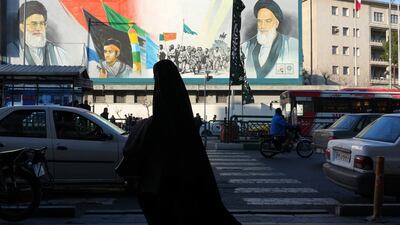Iran's Islamic clerical regime is divided in its response to months of unprecedented protests, wavering between repression and what it views as conciliatory gestures in trying to quell the discontent, analysts have said.
"The conflicting messages we are getting from the Iranian regime suggest an internal debate on how to deal with ongoing protests," said Nader Hashemi, director of the Centre for Middle East Studies at the University of Denver.
"In most authoritarian regimes, there are hawks and doves" who disagree on how repressive the state should be during crises, he said.

















The granting of retrials to several death-row protesters and the release from detention of prominent dissidents are signs that some officials favour a softer approach.
But a reminder of the hardline tack came on Saturday when Iran executed two men for killing a paramilitary member during protest-related unrest.
Demonstrations began after the death in custody of Kurdish-Iranian Mahsa Amini, 22, on September 16. She had been arrested by morality police who enforce a strict dress code which requires women to wear a headscarf covering their hair and neck.
The protests have escalated into calls for an end to the regime, posing the biggest challenge for the clerics since the 1979 revolution deposed the shah.
Authorities have responded with deadly violence in which hundreds have been killed.
Thousands have been arrested and 14 sentenced to hanging, many for killing or attacking security force members, according to the judiciary.
The Supreme Court has upheld some of the death sentences and a total of four men have been executed to date. The judiciary has also announced retrials for six of the 14.
This reflects a "political calculus", said US-based Iran expert Mehrzad Boroujerdi, co-author of Post-Revolutionary Iran: A Political Handbook.
"They know that mass executions will bring more people into the streets and further agitate them," he said. "On the other hand, they want to send a signal that they are not reticent to execute protesters so that people are intimidated."
In what analysts see as another attempt to calm the situation, two prominent dissidents arrested early during the protests, Majid Tavakoli and Hossein Ronaghi, were freed weeks later. Mr Ronaghi had been on a hunger strike.
co-author of 'Post-Revolutionary Iran: A Political Handbook'
The regime is using "everything from pressure release valves to long prison terms and executions," Mr Boroujerdi said. "They are experimenting with these as they struggle to formulate a more clearly articulated policy."
Anoush Ehteshami, director of the Institute for Middle Eastern and Islamic Studies at the UK's Durham University, said the retrials partly reflected mounting foreign and domestic pressure.
"But also within the regime there is division about how to handle this," he said, with hardliners on one side and others who see executions as further encouraging resistance.
Retrials and the release of dissidents are "measures of appeasement ... to try to throw a bone" to the protesters, Mr Ehteshami added.
While such measures may appear insignificant, from the perspective of a "securitised, beleaguered regime ... they think they are being magnanimous and responding to public pressure".
Celebrities have also been detained but often for far shorter periods. The actress Taraneh Alidoosti was on Wednesday freed on bail after being held for almost three weeks over her support for the protests, her lawyer said.
Some analysts see this hold-and-release strategy as intimidation but it is also, Mr Hashemi says, part of the regime "testing the waters, seeing what the reaction is".
The "leniency" sometimes displayed by authorities "is an attempt to prevent further factionalism within the security establishment" as some of its members are alienated by the deadly bloodshed, said Afshin Shahi, associate professor in Middle Eastern studies at Keele University in the UK.
The regime "doesn't seem to have a clear strategy" in response to public anger, he added.
Despite some releases, other prominent figures have spent months in prison. These include long-time activist Arash Sadeghi and the two Iranian journalists who helped expose Ms Amini's case.
Mohammad Jafar Montazeri, the Prosecutor General, early last month said the morality police had "been abolished" but no one else has confirmed this.
The announcement reflects the internal debate and shows that "at least one section of the ruling regime" favours a less brutal way of enforcing the female dress code, Mr Hashemi said.
According to Mr Ehteshami, some in authority "are now beginning to talk about a compromise", though it is too early to know what that would be.
But "in broad terms I don't think they have what the people want", which is wholesale change, the details of which have not been defined, he said.
The regime, however, has historically shown an ability to "make concessions when it has to", Mr Hashemi said.
"People forget that this regime has survived for 44 years because it can be very intelligent, very clever, very Machiavellian in terms of what it has to do to survive," he said.

